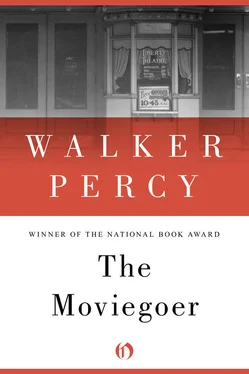“I don’t know.”
“But I do know! I found out, Binx. None of you could have told me even if you wanted to. I don’t even know if you know.”
I wait gloomily. Long ago I learned to be wary of Kate’s revelations. These exalted moments, when she is absolutely certain what course to take for the rest of her life, are often followed by spells of the blackest depression. “No, I swear I don’t believe you do,” says Kate, peering into my face, into one eye and then the other, like a lover. “And my telling you would do no good.”
“Tell me anyhow.”
“I am free. After twenty-five years I am free.”
“How do you know?”
“You’re not surprised?”
“When did you find out?”
“At four thirty this afternoon, yesterday afternoon.”
“At Merle’s?”
“Yes. I was looking up at his bookshelf and I hadn’t said anything for a long time. I saw his book, a book with a sort of burlap cover that always struck me unpleasantly. Yet how hard I had tried to live up to him and his book, live joyfully and as oneself etcetera. There were days when I would come in as nervous as an actress and there were moments When I succeeded — in being myself and brilliantly (look at me, Merle, I’m doing it!), so brilliantly that I think he loved me. Poor Merle. You see, there is nothing he can say. He can’t tell me the secret even if he knew it. Do you know what I did? After a minute or so he asked me: what comes to mind? I sat up and rubbed my eyes and then it dawned on me. But I couldn’t believe it. It was too simple. My God, can a person live twenty-five years, a life of crucifixion, through a misunderstanding? Yes! I stood up. I had discovered that a person does not have to be this or be that or be anything, not even oneself. One is free. But even if Merle knew this and told me, there is no way in the world I could have taken his advice. How strange to think that you cannot pass along the discovery. So again Merle said: what comes to mind? I got up and told him good-by. He said, it’s only four thirty; the hour is not yet over. Then he understood I was leaving. He got interested and suggested we look into the reasons. I said, Merle, how I wish you were right. How good to think that there are reasons and that if I am silent, it means I am hiding something. How happy I would be to be hiding something. And how proud I am when I do find secret reasons for you, your own favorite reasons. But what if there is nothing? That is what I’ve been afraid of until now — being found out to be concealing nothing at all. But now I know why I was afraid and why I needn’t be. I was afraid because I felt that I must be such and such a person, even as good a person as your joyous and creative person (I read your articles, Merle). What a discovery! One minute I am straining every nerve to be the sort of person I was expected to be and shaking in my boots for fear I would fail — and the next minute to know with the calmest certitude that even if I could succeed and become your joyous and creative person, that it was not good enough for me and that I had something better. I was free. Now I am saying good-by, Merle. And I walked out, as free as a bird for the first time in my life, twenty-five years old, healthy as a horse, rich as cream, and with the world before me. Ah, don’t disapprove, Binx. Binx, Binx. You think I should go back! Oh I will, no doubt. But I know I am right or I would not feel so wonderful.”
She will not feel wonderful long. Already the sky over the Chef is fading and soon the dawn will glimmer about us like the bottom of the sea. I know very well that when the night falls away into gray distances, she will sink into herself. Even now she is overtaking herself: already she is laboring ever so slightly at her exaltation.
I take her cold hands. “What do you think of this for an idea?” I tell her about the service station and Mr Sartalamaccia. “We could stay on here at Mrs Schexnaydre’s. It is very comfortable. I may even run the station myself. You could come sit with me at night, if you liked. Did you know you can net over fifteen thousand a year on a good station?”
“You sweet old Binx! Are you asking me to marry you?”
“Sure.” I watch her uneasily.
“Not a bad life, you say. It would be the best of all possible lives.” She speaks in a rapture — something like my aunt. My heart sinks. It is too late. She has already overtaken herself.
“Don’t — worry about it.”
“I won’t! I won’t!”—as enraptured and extinguished in her soul, gone, as a character played by Eva Marie Saint. Leaning over, she hugs herself.
“What’s the matter?”
“Ooooh,” Kate groans, Kate herself now. “I’m so afraid.”
“I know.”
“What am I going to do?”
“You mean right now?”
“Yes.”
“We’ll go to my car. Then well drive down to the French Market and get some coffee. Then well go home.”
“Is everything going to be all right?”
“Yes.”
“Tell me. Say it.”
“Everything is going to be all right.”
1
SATURDAY MORNING AT the office is dreary. The market is closed and there is nothing to do but get on with the letter writing. But this is no more than I expected. It is a fine day outside, freakishly warm. Tropical air has seeped into the earth and the little squares of St Augustine grass are springy and turgid. Camphor berries pop underfoot; azaleas and Judas trees are blooming on Elysian Fields. There is a sketch of cloud in the mild blue sky and the high thin piping of waxwings comes from everywhere.
As Sharon types the letters, I stand hands in pockets looking through the gold lettering of our window. I think of Sharon and American Motors. It closed yesterday at 30 1/ 4.
At eleven o’clock it is time to speak.
“I’m quitting now. I’ve got sixty miles to go before lunch.”
“Wherebouts you going?”
“To the Gulf Coast.”
The clatter of the typewriter does not slacken.
“Would you like to go?”
“M-hm”—absently. She is not surprised. “It just so happens I got work to do.”
“No, you haven’t. I’m closing the office.”
“Well I be dog.” There is still no surprise. What I’ve been waiting to see is how she will go about shedding her secretary manner. She doesn’t. The clatter goes on.
“I’m leaving now.”
“You gon let me finish this or not!” she cries in a scolding voice. So this is how she does it. She feels her way into familiarity by way of vexations. “You go head.”
“Go?”
“I’ll be right out. I got to call somebody.”
“So do I.” I call Kate. Mercer answers the phone. Kate has gone to the airport with Aunt Emily. He believes she is well.
Sharon looks at me with a yellow eye. “Is Miss Cutrer any kin to you?” she cries in her new scolding voice.
“She is my cousin.”
“Some old girl told me you were married to her. I said nayo indeed.”
“I’m not married to anyone.”
“I said you weren’t!” She tilts her head forward and goes off into a fit of absent-mindedness.
“Why did you want to know if I was married?”
“I’ll tell you one thing, son. I’m not going out with any married man.”
But still she has not come to the point of waiting upon my ministrations — like a date. Still very much her own mistress, she sets about tidying up her desk. When she shoulders her Guatemalan bag and walks briskly to the door, it is for me to tag along behind her. Now I see how she will have it: don’t think I’m standing around waiting for you to state your business — you said you were closing the office — very well, I am leaving.
I jump ahead of her to open the door.
Читать дальше












